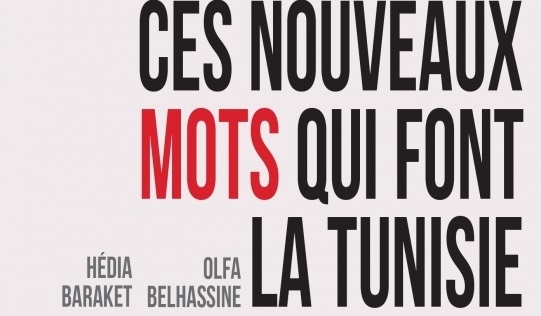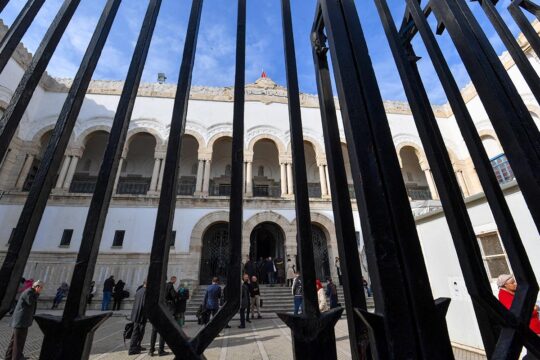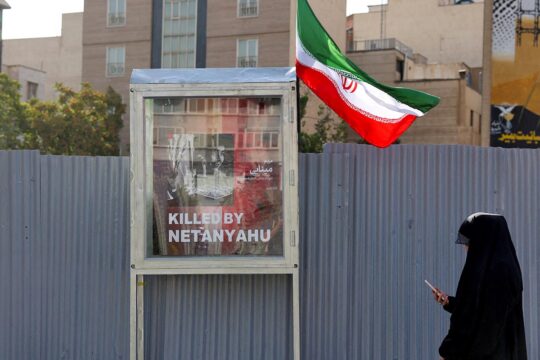We publish here extracts from a book co-authored by Olfa Belhassine, our correspondent in Tunisia, and journalist Hedia Baraket. “The New Words that make Tunisia” examines a linguistic “Big Bang” that started with the first emotions of the crowd at the end of 2010. Like a Pandora’s Box, the Tunisian Revolution is freeing speech and bringing new words full of promise, passion and intoxication. In this book, the authors share their research into a body of some 60 words and slogans and their origins. Here we publish extracts from the third chapter on the term civil society (Mojtama‘ madanî).
A southern town governor chairing the first regional development committee, set up to consult civil society on strategic projects, was surprised at the flood of different people wanting to take part. They included a trade unionist, a lawyer a former tribal chief (’omda), an artisan, a spokesman for striking miners, the head of a Koranic association and a member of an organization to preserve Berber culture. In an outraged tone, he sent half of them away, only allowing associations authorized by Law 88 to stay. “Get out! You are not civil society!” he ordered.
These new players in public life, presented as the “salt of democracy”, are either welcomed with open arms or sent away, according to the conception of mojtama‘ madanî held by different public officials.
Emna Menif, who heads the Kolna Tounes association, has been engaged for three years in promoting solidarity and sustainable regional development, but she wonders: “What are the missions of civil society? What kind of partnership can it forge with the State? How far can its relations with the parties go?”
She criticizes State demagogy in its relations with associations. “When the government sits round a table with the UGTT labour confederation or the UTICA employers’ organization, it is not talking to civil society but to interest groups,” she complains.
In fact the term “civil society”, introduced early in Europe to distinguish the body of society from religious and military orders and then from the domain of the State, is generic, shifting, multiform, subject to constant redefinition according to the socio-political stakes. “It is one of the most ambiguous notions in the current political debate,” writes political scientist François Rangeon.
The uncertainty that the term sows in people’s minds derives from the wide scope of its usage. Salsabil Klibi proposes two definitions. “The first is extensive. It includes all the social groups active outside of government and its institutions, i.e. intellectuals, lawyers, journalists, trade unions, NGOs, informal citizens’ groups, even extending to opposition political parties. The second is more restrictive, referring only to active, non-partisan, non-profit associations.”
However, in the plethora of associations born after January 14, it is not easy to separate the wheat from the chaff. Out of 17,762 associations listed up to January 17, 2015, only about 5,000 are active and have real expertise, long-term vision and viable projects, according to the Institute for Training, Development and Research on Associations (IFEDA).
Nevertheless, donor funds flooded in from around the world between 2011 and 2012. “We quickly associated democracy with civil society, without leaving Tunisians time to think more about this concept and adapt it to a specific context where, for example, community-based solidarity networks remain widespread in the interior of the country,” says Sélim Ben Hassan, public reform expert for several international bodies. Instead, dozens of non-profit groups have been spreading Wahhabite ideology and organizing departures to the death camps of Syria. “They have received funds of up to 70 million dollars from Qatar,” says the expert. “Many organizations serve to launder money from the parties and complement their action. Apart from Afek, all the political parties have offshoots in the form of associations.”
On July 22, 2014, the government of Mahdi Jomaa suspended the activities of 157 associations suspected of fuelling violence against the security forces and having links to terrorism.
And here too, like a mirror reflecting the faults and weaknesses of the political scene, leadership battles are raging.
“If the associations continue operating not as part of a network but propelled by the egos of their presidents, they will not become stronger,” warns Kamel Labidi, former president of the media reform body and now a driving force of the Civil Coalition for Defence of Free Expression. “We should remember how much the fragmentation of civil society fuelled dictatorship in the past.”
Civil society, a testing ground of the transition which some experts see as the tranquil face of the revolution, is still finding its feet in Tunisia.
Ces nouveaux mots qui font la Tunisie (“The new words that make Tunisia”), by Olfa Belhassine and Hedia Baraket, Cérès Editions, Tunis, March 2016, 360 pages, 12 Euros (available on Cérèsbookshop)






